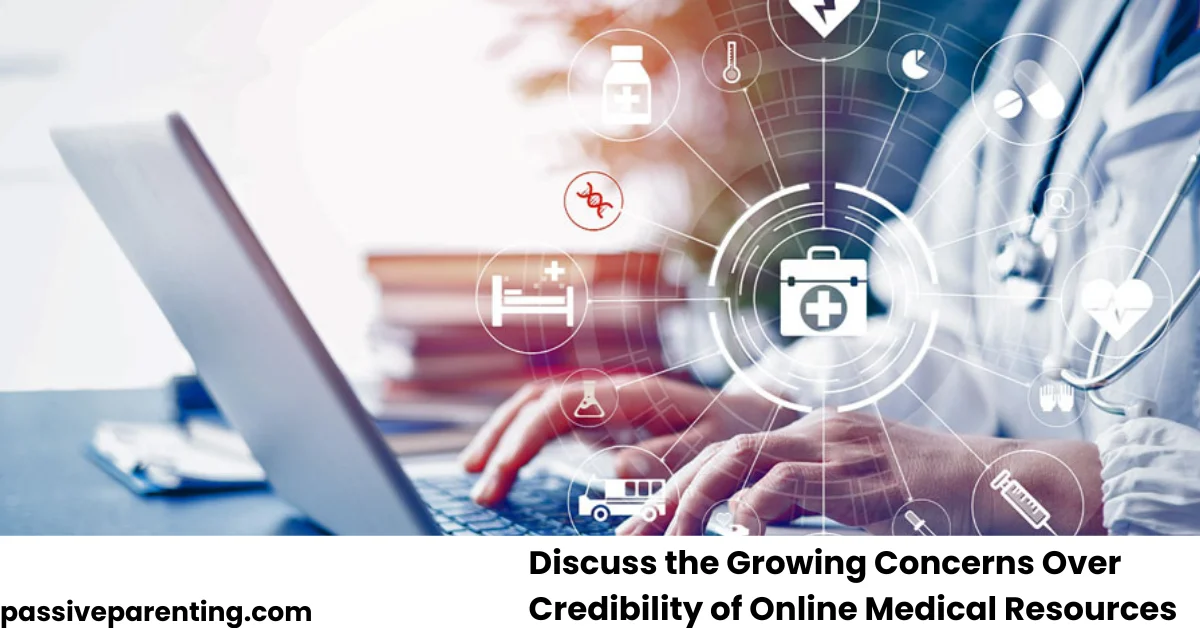In today’s digital-first world, millions of people rely on the internet for quick access to health information. While this accessibility can be empowering, it has also raised alarm bells about the credibility of online medical resources. From social media influencers sharing unverified health hacks to AI-generated articles with questionable accuracy, the concerns over digital health information are more pressing than ever. This article aims to discuss the growing concerns over credibility of online medical resources, explore the risks, and offer strategies to evaluate trustworthy sources.
The Rise of Online Health Information
The internet has revolutionized how people approach their health. According to Pew Research, nearly 77% of online health seekers begin with a search engine, typing in symptoms, conditions, or treatments. Platforms like WebMD, Healthline, Mayo Clinic, and even Reddit are now go-to hubs for instant answers. While this shift offers convenience and autonomy, it also opens the floodgates for misinformation in healthcare.
Increased demand for medical answers online has led to the rise of:
- User-generated content without medical oversight
- AI-written health articles lacking human review
- Social media influencers pushing unverified treatments
Why Online Medical Credibility is Becoming a Concern
The credibility of online health information is under scrutiny for several reasons. One major issue is the lack of standardized quality control across digital platforms. Unlike peer-reviewed medical journals, many websites and blogs don’t fact-check their content or ensure it’s written by qualified professionals.
Key reasons for concern include:
- Fake medical advice online from non-experts
- Misleading health content driven by SEO or ad revenue
- Self-diagnosis risks based on incomplete or false data
These issues can lead to dangerous outcomes, especially when people take advice from sources with no accountability.
Risks of Unreliable Online Medical Information
Unreliable or misleading online medical information can have serious consequences. The most common dangers include:
- Delayed professional care: Relying on incorrect information can prevent people from seeking timely help.
- Misdiagnosis: Self-diagnosing based on symptoms from random sites often leads to confusion and fear.
- Improper treatments: From harmful herbal remedies to rejecting life-saving medicine, unverified advice can cause physical harm.
- Increased anxiety: Misinformation can worsen health-related stress, especially for those with chronic illnesses.
COVID-19 was a turning point in revealing the dangers of unverified medical resources. From conspiracy theories to unsafe remedies, digital platforms became breeding grounds for misinformation.
What Makes a Medical Resource Credible?
To protect your health and make informed decisions, it’s crucial to know how to spot trustworthy medical websites. Credible sources usually share these traits:
- Expert authorship: Articles are written or reviewed by certified medical professionals.
- Citations and references: Good health content links to peer-reviewed studies and clinical guidelines.
- Clear editorial policies: Credible sites disclose their content creation and review process.
- Affiliation with known organizations: Government (.gov), education (.edu), and reputable health organizations (.org) are generally more reliable.
Trusted examples include:
- Mayo Clinic
- Centers for Disease Control and Prevention (CDC)
- World Health Organization (WHO)
- National Institutes of Health (NIH)
The Role of Social Media in Spreading Misinformation
Social media platforms have become central to the spread of medical misinformation. Viral videos, sensational health claims, and emotionally charged posts often get more engagement than accurate, science-backed content.
Popular platforms contributing to this trend include:
- TikTok – Known for viral health trends with little evidence
- YouTube – Home to influencers and conspiracy theorists
- Instagram & Facebook – Spread of diet fads and miracle cures
Algorithms favor shareability over accuracy. Influencers without medical training often present personal experiences as universal truths, which can lead followers astray.
How to Evaluate Online Medical Information
The ability to evaluate online health resources is a vital part of digital health literacy. Here’s how you can protect yourself:
- Check the author’s credentials: Are they a doctor, nurse, or health expert?
- Look for references: Reputable sites cite scientific sources.
- Examine the domain: Prefer .gov, .edu, and established .org domains.
- Cross-check facts: Verify information across multiple trusted websites.
- Avoid anecdotal evidence: Personal stories are not substitutes for medical science.
Tools like Google’s “About This Result” and fact-checking platforms like Snopes or HealthFeedback.org can help you validate information quickly.
Promoting Health Literacy in the Digital Age
To address these issues, both individuals and institutions must work to improve health literacy online. The ability to critically analyze health information should be taught in schools and reinforced by healthcare providers.
Strategies to improve health literacy include:
- Educational programs: Integrate digital health awareness into school curriculums
- Workshops for adults: Community centers can host events to teach source verification
- Doctor-patient communication: Physicians should guide patients toward reliable resources
Healthcare organizations are also investing in AI tools to detect misinformation, and companies like Google are elevating content from WHO-verified sources in search results.
Future Outlook: Can We Restore Trust in Digital Health Content?
Rebuilding trust in online medical resources will require a coordinated effort among tech companies, healthcare institutions, and content creators. The future of digital health information may include stronger regulation of health claims across online platforms, the integration of AI-driven fact-checking tools, and greater transparency in how content is created and reviewed. Platforms like YouTube and Meta have already begun labeling health-related videos and prioritizing content from verified medical sources in their algorithms. However, these steps are just the beginning—more comprehensive action is needed to address misinformation at its root and ensure users have access to accurate, reliable medical guidance.
FAQs About Online Medical Resource Credibility
Conclusion: Navigating Online Health Information Responsibly
As we continue to embrace digital health, it is essential to remain vigilant. The growing concerns over the credibility of online medical resources are valid and deserve thoughtful action. From evaluating sources and asking the right questions to improving health literacy and supporting trustworthy platforms, every user plays a role in shaping the future of health information.
Staying informed means staying safe. Trust your doctor, double-check what you read, and always prioritize facts over viral claims.



